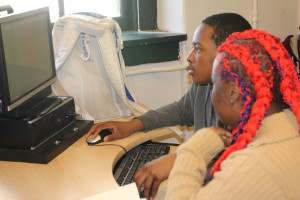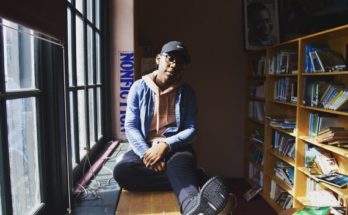It’s a 30-minute walk from Spencer Jones’ home to his future. At 8 a.m. most weekdays, the 16-year-old leaves the cramped two-bedroom Bedford-Stuyvesant apartment he shares with his mother and older sister and heads for P-TECH, Pathways in Technology Early College High School, in neighboring Crown Heights and what he hopes will be a “future as the mechanical engineer of the year, maybe working at a big company or IBM.” He also dreams of having his own company as big as IBM.

Jones is a member of the legacy, or first, class at P-TECH, a six-year high school created by the city Department of Education in collaboration with IBM and the City University of New York’s City Tech College. Through coursework, mentorships and internships, the school prepares students for careers in science, technology, engineering and math. Those who complete the full tuition-free program will earn an associate degree in applied science.
As part of the partnership with IBM, students have access to paid internships and are guaranteed first crack at IBM jobs on graduation.
“Students are not first in line for a job after they have earned some college credits,” said school principal Rashid Davis. “Students are first in line for job opportunities after they have successfully completed the model.”
P-TECH is becoming more popular among potential students. A total of 103 students, including Jones, entered the first semester in fall 2011. All were admitted through the school’s open enrollment process. This spring, more than 1,500 students applied for the 144 available seats for 2014-15.
“I didn’t want to come here at first,” Jones said. “I always thought about Brooklyn Tech because that’s where my mom went. But I didn’t get into Brooklyn Tech. I didn’t get into any schools the first round that I tried to apply.”
“P-TECH was none of their choices,” said Davis. “Because they didn’t get into the specialized schools, because the students weren’t as competitive as their peers from 8th grade,” their only opportunity was “to apply to the new school,” he said.
Now, the success of the P-TECH model hinges on the success of Jones and the remaining 99 members of his class. “Until I can keep the kids beyond year four, we’re just like any other high school,” Davis said.
“What we’re trying to do with taking students who are not academically screened to finish simultaneously the high school diploma and an associate’s in applied science almost seems impossible,” he added. “I need to have them run as fast as humanly possible to taste enough of success to make them believe that there’s a reason to stay beyond the 12th grade.”
While Davis is cautious about overestimating the school’s success before even a single student has graduated, it hasn’t stopped others from trying to copy P-TECH’s approach.
“I loved seeing both the culture you are creating, and how committed your students were to their own education,” wrote U.S. Secretary of Education Arne Duncan in a note to Davis after he and President Barack Obama visited the school in October. “You are building a model that has real national implications.
New York Gov. Andrew Cuomo included $4 million in the 2013-14 state budget to help create 16 new P-TECH partnerships around the state and added another $2.5 million for 2014-15 to support their growth. The federal government announced in April it was making available $103 million, including $7 million for the city, to expand the model nationally.
“We’re in four states now and we haven’t even completed year three,” said Davis. In addition to New York State, Connecticut, Idaho and Illinois have launched similar schools.
Policymakers are pinning their hopes for P-TECH’s success on Jones and a small cadre of students Davis calls trailblazers. If they had not done well in those early college classes, he said, “we wouldn’t be hearing about all of this now.” The pressure for them to succeed is everywhere.
Spencer’s Journey
On the early morning streets in his neighborhood, Jones, with the white cord from his ear buds dangling from under a Brooklyn Nets cap and gray hoodie, is just another teen heading to school. He is a pensive young man with a nascent mustache who delights in telling people how surprised his college classmates are to learn he’s 16. But as color posters, featuring their smiling faces, scattered throughout P-TECH proclaim, “Spencer Jones is college and career ready,” as are more than a dozen of his classmates. They comprise an elite 16 of students who are ahead of schedule to complete their college-degree requirements.
Their principal said he is “pushing as much as I can and as fast as I can move” to ensure the school has the academic courses in place to keep up with their accelerated pace. Davis, whose office at the end of a long corridor affords a clear view of the school’s comings and goings, charts each student’s progress. Eighty-six students in the legacy class are taking college classes. By the end of the fifth semester, more than half the class was well on its way to satisfying degree requirements: 31 had completed 25 percent of the requirements for a degree in computer systems technology (one of the two degree offerings available) and 26 had completed at least a quarter of the requirements for a degree in electromechanical technology. The latter is the most demanding track, requiring college calculus and two levels of college physics, and Jones had completed 36 percent of it as of December.

“I’m more than halfway because I’m trying to finish college and high school at the same time,” Jones said. “It gives me a better chance at getting a full scholarship,” he said, referring to his goal to pursue a bachelor’s degree in electromechanical engineering technology once he graduates P-TECH.
Davis said his challenge is to get students “to believe that they can” succeed in college classes. “Because, when they believe, they’ll adjust their behaviors,” he said. “That’s the whole beauty of college. You have to learn how to manage yourself independently. Spencer believes now, and he’s changed his behavior and his habits and what he’s doing. That’s success.”
Davis, with his salt-and-pepper dreadlocks, is as much the public face of P-TECH as his trailblazer students. He has master’s degrees in publishing, English education, and he is finishing work on his doctorate of education in urban leadership at Fordham University. He relocated to Brooklyn from the Bronx to be within walking distance of the school, which is surrounded by housing projects.
“It adds a different since of urgency to why this work matters,” he said.
He arrives at school by 6:30 a.m. or 7 a.m. most mornings and can still be found walking the halls well into the evening and on weekends. He advises those principals who are about to launch schools modeled after P-TECH to maximize their free time now because “you’re not following a script, you’re trying to beat the odds and beating the odds doesn’t mean you can work 9 to 5 and call it a day.”
The schedule is just as demanding for students. Jones, like his classmates in the vanguard class, divides his week between City Tech and P-TECH. Mondays he’s a high schooler. On a recent Monday during third period, he portrayed Scottish philosopher and economist Adam Smith as part of a class project on the Industrial Revolution. In character, he convincingly told the moderator of a mock talk show, “The real tragedy of the poor is the poverty of their aspirations.”
“Spencer is at the very high end of our academic spectrum,” said Will Ehrenfeld, Jones’ global history teacher. “He’s much more self-directed.” Ehrenfeld said he’s had to adjust the structure of the class to accommodate the schedule of students taking college courses. Most assignments are “project based, based on independent learning; online, blended learning; and independent student work,” he said. “Scheduling gives priority to the college courses. Spencer is at the upper end of acceleration.”
Unseen by outside observers is the value of those intangibles added by Davis and students’ families. Born in Florida, Jones has grown up in Brooklyn. His divorced parents are both actively engaged in his life. His mother, Kimberley Benjamin-Jones graduated from Brooklyn Technical High School and holds an associate degree in business administration. The mother of two (her daughter, Kyra, is majoring in Asian Studies at Hunter College), she has been unemployed and job-hunting since being laid off from a Manhattan accounting firm in early 2013. Spencer’s father, Alton Jones, is a conductor for the Metropolitan Transportation Authority and lives in Brooklyn. He has an associate degree from Miami Dade Community College.
In the living room of the family’s apartment, two bookcases holding a leather-bound set of classics, including “Moby Dick” and “The Canterbury Tales,” along with paperback novels, occupy a wall. “Once upon a time,” said Jones’ mother, “I thought I would have a house with a library.” Benjamin-Jones, a voracious reader who often gives her children books, took them on weekly trips to the local library as they were growing up. When she’s not job-hunting, she is at P-TECH, volunteering or cheering her son on.
Seeing where Spencer is now, she believes it was “divine intervention” that he didn’t get into the first 12 schools to which he applied.
“It’s taken him on a path that he’s interested in,” she said. “He has taken ownership of his education and where he’s going. He’s beginning to appreciate how good it feels to have those A’s you have to work for.”
At the beginning of the year, Jones’ schedule of six college courses, his high school work and baseball practice was so demanding that he convinced P-TECH administrators to allow him to withdraw from one of his college classes.
“Psychology wasn’t helping, just making it worse,” said Jones. “I felt if I withdraw now, I’d be able to keep my grades up for the more important classes – like the classes that lead toward my computer core requirements. I refuse to fail a class, and failing for me is anything less than a B or B-.”
Early college high schools are rigorous, according to Evelyn Maclutsky, who coordinates the state Education Department’s Smart Scholars Program, which began with 11 schools in 2009 and now has 21 statewide, including P-TECH. She said having an employer partner distinguishes the P-TECH model from the others. Otherwise “every early college high school is partnered with at least one college,” Maclutsky said, adding that the college courses are all taught by college faculty. “It’s not like taking an AP class,” she said.
The Smart Scholars schools all have student bodies that are majority African-American and Hispanic – and majority male. P-TECH’s 2014-15 incoming class will be two-thirds male and a third female. “It’s good to see that women aren’t being afraid of technology,” Davis said.
But doing well in school isn’t the only goal. P-TECH teachers are also preparing their students for work.
Jones arrived early for his last class of the day, Virtual Enterprise. For two periods, the students, divided into teams, ran their own virtual company. The class was noisy. In addition to the dozen or so Virtual Enterprise students, there were a handful of other students looking for extra help from technology teacher Tanya Spence. Davis explained that teachers allow students needing academic support with their college coursework to come to their classrooms for assistance “as long as they are not disruptive.” Spence cautioned more than once that those students not scheduled to be there would have to leave if things didn’t quiet down. Jones took his seat at the computer in a cubicle at the rear of the room. For the semester, he is vice president of technology for Titan Inc., a software development company that specializes in virtual reality, whose motto is “Rise above the Rest.” The assignment that day was to create a virtual 3-D model of a school.

A recent snafu involving Titan Inc. showed how easily the school’s best-laid plans can be derailed. Titan Inc. was one of three teams representing P-TECH at the Virtual Enterprises International Youth Business Summit in early April in Manhattan. The conference brought together multinational student teams to showcase their global businesses, ranging from solar-powered backpacks to reversible neckties.
The company was supposed to be taking virtual orders from potential “buyers” for its 3-D video game and car, but a snafu with a banner-maker delayed their teacher, Spence, by more than three hours. Without their materials or a product prototype – and only neon sheets of paper at their disposal – team members folded and, surprisingly, sold colorful origami bowties, birds and pinwheels, starting at $250 each in Virtual Enterprise currency, while they waited.
“This is authentic reality,” Jones’ mother, who volunteered at the conference, told the students. “You’ve learned something today,” she said. “I’m not sure what.”
The lesson was cut short by the arrival of Spence, along with their iPads, shirts with the team’s logo, balloons, business cards – and banners. Fifteen minutes after she got there, Titan Inc. was open for business.
The class was meeting just a little over a week since that mishap. It ended early so that eligible students could be briefed on the summer internship program. Seventy-five percent of the legacy class has qualified to participate in the paid job program. The internships, which pay from $8 to $14 an hour, will be the first paying jobs for many in the group and they had questions.
“What if you land a job outside your skill set?” one student asked.
“What if you completely blow the interview?” asked another.
“What if you get an internship you just don’t want to do?” Jones said. “I’m not going to be the coffee guy, right?”
“You are the first going out,” Angela Bertrand, who oversees the internship program, told them. “You have to set an example. You are the start.”
Like all the students, Jones has had an IBM-staff mentor since coming to P-TECH. Ryan Martin, 34, a chemical engineer at IBM’s TJ Watson Lab in Yorktown Heights, has been meeting with him in person twice a year since the school launched. They also connect online through the school-provided “Mentor Place” web site.
“He’s really cool,” said Jones. “He inspired me to get to where I want to go because he tells me how much fun it is to do what he loves and to do it with other people.”
Martin is also impressed.
“I’ve been blown away; I didn’t really how what to expect from a high school kid,” he said. “I’m really impressed with his character and how responsible he is with all his assignments and his workload.”
Martin, who has a PhD. in chemical engineering from the University of California Los Angeles, said most students don’t have a role model or “someone planting a seed in their brain that you can go to college and you can compete.” He believes Jones “is going to be highly qualified for a job with IBM.”
Bertrand and the committee responsible for identifying internship placements are working behind the scenes to insure a spot for every student who qualified. The current employer list includes IBM, the Brooklyn Navy Yard, CUNY, City Tech, and Grand Central Tech. P-TECH staff will match the students based on their skills and college credits. Students will also have to interview for the position.
A fire alarm brought an early, abrupt end to the day as students empty onto the streets. Jones went in search of his girlfriend. He had a little time before baseball practice.
Meanwhile, Davis at the end of the day sounded confident that his students will be competitive with graduates from the city’s specialized high schools when it comes to college acceptances and job offers. “Comparison is not fair because the preparation is different,” he said. “Spencer has proven he can handle the rigors of college. Where they have proven they can handle the rigors of the most rigorous high schools in the country.” Will they be on a level playing field? he asked before answering his own question. “No, because our students may have an advantage.”



